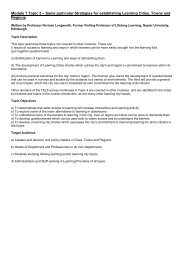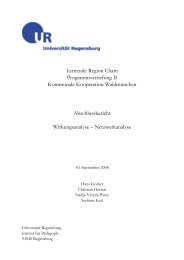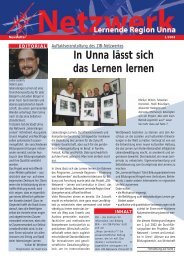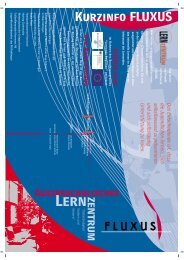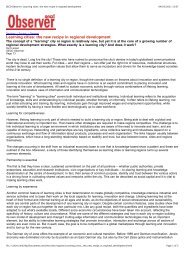SWOT-analysis as a basis for regional strategies - EUROlocal
SWOT-analysis as a basis for regional strategies - EUROlocal
SWOT-analysis as a basis for regional strategies - EUROlocal
You also want an ePaper? Increase the reach of your titles
YUMPU automatically turns print PDFs into web optimized ePapers that Google loves.
above have been tackled at le<strong>as</strong>t to the extent that a programming document h<strong>as</strong> been<br />
written, equipped with a strategic <strong>analysis</strong> leading to the major developmental<br />
guidelines <strong>for</strong> a definite period of time. But the key question remains: who is to act<br />
according to these guidelines?<br />
3.2 Confidence-building in an ostensibly utilitarian setting<br />
Clearly, although the strategy - and the <strong>analysis</strong> <strong>as</strong> its integral part - is meant to be<br />
everyone’s (i.e. the <strong>regional</strong> community’s) shared strategy, it hardly h<strong>as</strong> the potential<br />
to become anyone’s (i.e. the individual RAAs’ or RSG-members’) individual strategy,<br />
due to the sheer lack of financial resources. The best that can be reached in the<br />
divided responsibility setting is that the region’s strategy will provide the necessary<br />
tools <strong>for</strong> the RAAs and the RSG-members to design their own <strong>strategies</strong> <strong>as</strong> <strong>regional</strong><br />
developers 1 accommodating both their own and their shared visions <strong>as</strong> set <strong>for</strong>th in the<br />
programme. This function of the programming document can be called confidence<br />
creation or confidence building.<br />
Theoretically the major function of confidence building is to turn a non-co-operative<br />
decision-making setting to a pro-co-operative one. The methodological individualism<br />
underlying neo-cl<strong>as</strong>sical economic thinking is generally in favour of non-co-operative<br />
solutions, whereby it is <strong>as</strong>sumed that each actor aims at maximising his or her own<br />
utility. Any co-operation which does take place is seen to emerge <strong>as</strong> a “higher order of<br />
individual utility maximisation”, which also explains the existence of organisations <strong>as</strong><br />
bundles of diverse interests. Actor networks, in turn, become created, <strong>as</strong> the actors<br />
seek to widen the sphere of single decision-making system without incre<strong>as</strong>ing its<br />
internal complexity through widening the own organisational structure. Even the<br />
networks <strong>as</strong> expressions of one shared mission can thus be given an individualistic<br />
interpretation.<br />
Due to the prescriptions of methodological individualism, co-operation among<br />
parallel actors, organisations or networks can e<strong>as</strong>ily be discarded <strong>as</strong> an exception<br />
rather than a rule of human interaction. Refraining from co-operation emerges <strong>as</strong> the<br />
prevailing model if an actor <strong>as</strong>sesses that this line of action either maximises his or<br />
her own utility or at le<strong>as</strong>t minimises the losses he or she otherwise would have to<br />
suffer. At le<strong>as</strong>t this is how the utilitarian “each man <strong>for</strong> himself” teaching goes,<br />
providing the individualist ideology with its necessary philosophical grounds. Its<br />
weaknesses – given the fact that systems of co-operation can be found on every<br />
imaginable scale of living organisms, and that they have already been transferred to<br />
man-made systems such <strong>as</strong> community robots – are elegantly portrayed in game<br />
theoretical <strong>for</strong>ms in further elaboration of the famous prisoner’s dilemma model (cf.<br />
e.g. Axelrod 1984; McKenna 1986).<br />
3.3 From individualist utilitarianism towards more co-operative <strong>strategies</strong><br />
The individualistic explanation may be valid in situations in which actors meet with<br />
each other sporadically, do not know each other, and have to make their decisions on<br />
1 It is to be noted here that an organisation may have multiple roles, and that even though an enterprise must<br />
concentrate on its core competencies and make the bulk of strategic decisions b<strong>as</strong>ed on this fact, it also may be<br />
highly profitable <strong>for</strong> it to engage in activities that affect the development of its immediate operation environment<br />
and thus aim at (pro-)active stakeholdership in issues related to development of its surrounding region.<br />
31



